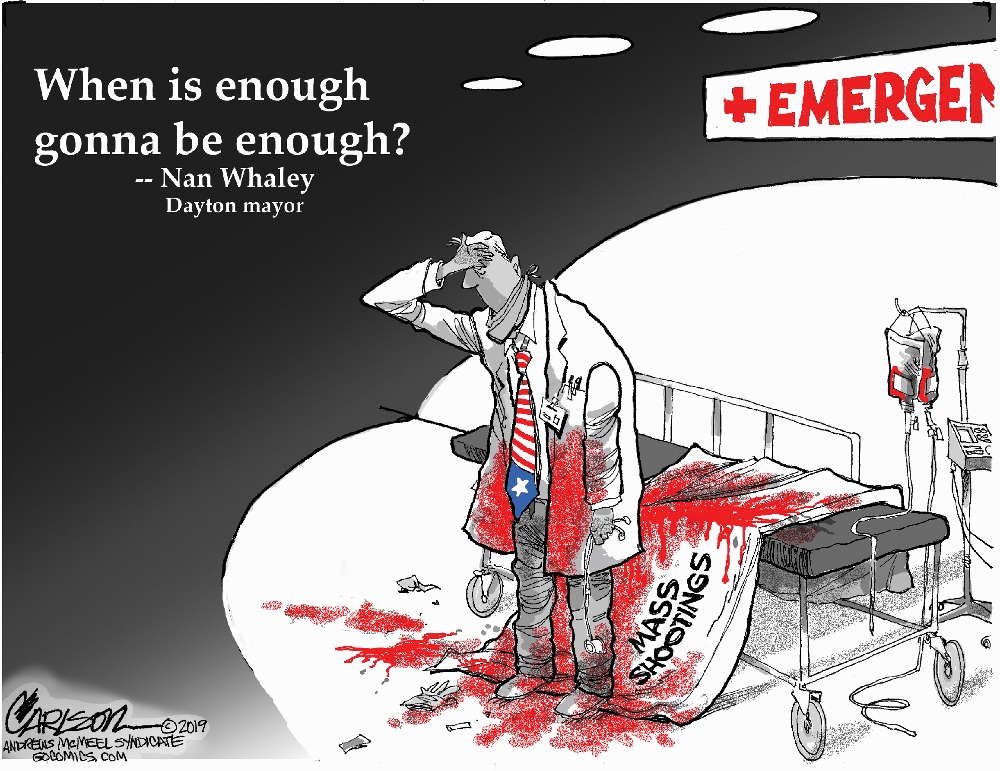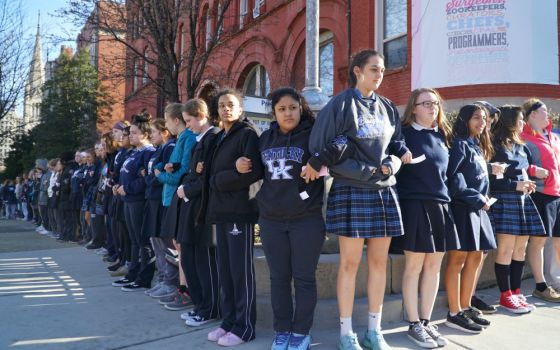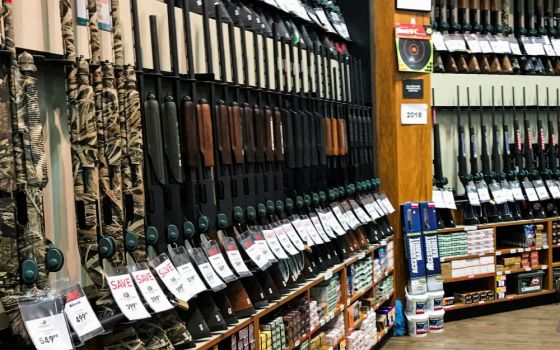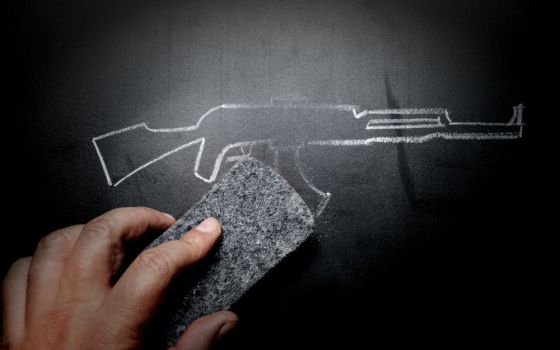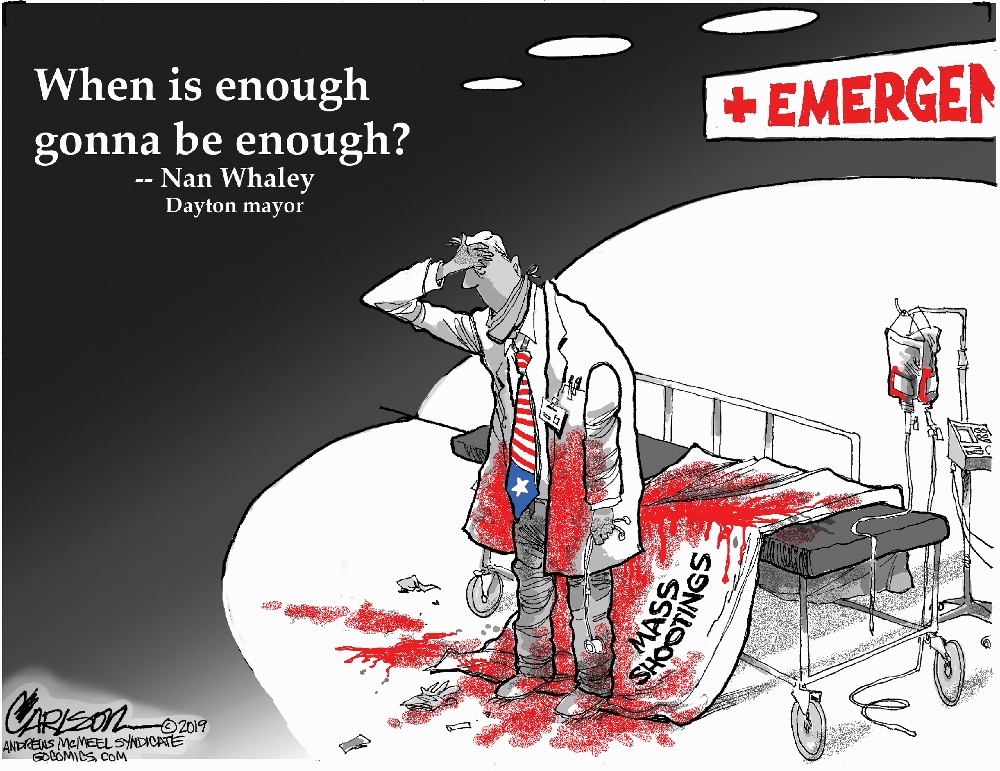
When the shock wears off, it is time to get to work, and after a weekend of mass killings — as I write, the body count stands at 22 in El Paso, Texas, and nine in Dayton, Ohio — there is much work to be done.
The religious communities in these towns must help the families of the victims to mourn. They must bury the dead, one of the corporal works of mercy and one that is often overlooked. At moments like this, we understand how much of a grace it is. Let friends and family help the victims' friends and family cope with the enormous burden thrust upon them. This work of mercy is vital.
Law enforcement has also begun its work. The police must investigate the motives of the killers. In the case of Connor Betts, who killed nine people in a popular entertainment district in Dayton, no motive is clear. The fact that his sister is among those killed adds a bizarre aspect to it all.
In the case of Patrick Crusius, the mass murderer in El Paso, the motive is clear: Crusius published a screed online minutes before he began his killing spree, a manifesto that repeated many of the president's talking points, albeit in exaggerated form. Crusius, like President Donald Trump, spoke of an invasion of our southern border, an invasion that was a threat to America. Crusius' manifesto worried that white people were being "replaced," as did the white supremacists who marched in Charlottesville, Virginia, bearing torches and chanting, "Jews will not replace us" — white supremacists whom the president said included good people.
In May, at a campaign rally in Panama City, Florida, the president asked rhetorically, "How do you stop these people?", referring to immigrants. Someone in the crowd shouted out, "Shoot them!" The crowd cheered and the president joked about it, saying, "That's only in the Panhandle you can get away with that statement." The video was chilling when we saw it for the first time. We did not know the video was prescient.
Why should we be surprised? If you believe what the president said, that the arrival of thousands of desperately poor people at our southern border is "an invasion" and that our national life is threatened by this, wouldn't it be right to take up arms to defend our country and our culture? Our commander in chief told us there was a threat and Crusius was merely taking it seriously.
And if it is OK for the president to use inhumane detention policies and family separations to deter migration, shooting a few people at a mall is a difference in degree but is it really a difference in kind?
The rest of us have different work to do. We have to decide what, as citizens, we are called to do when a race-baiting president repeatedly kindles hatred. I am not one to equate speech with violence. The connections are more tenuous than people like to admit. Trump did not use legally incendiary language of a kind that would be beyond First Amendment protection. He did not shout, "Fire!" in a crowded theater.
Or did he? His culpability in relation to the attack in El Paso is not direct, but can anyone say it is not real? How is telling people that we are being invaded different from telling people the theater is on fire?
Another group that has escaped culpability for these mass killings is gun manufacturers. They argue that their products are not intended to kill people in a Walmart. We do not hold Ford or GM accountable when a drunk hits someone with a car.
But is the comparison a good one? Guns are designed to kill. Yet, we are required to get a license for the car and not the gun. And making assault weapons available to anyone would be like inviting everyone to drive 150 miles per hour down a city street: It is reckless and dangerous.
There is nothing that will keep some people from committing acts of violence so long as we permit widespread gun ownership in this country. What we can do, however, is stop the sale of assault weapons. Crusius and Betts may have been determined to kill, but they might not have been able to kill so many, and they would have been more easily overpowered, if they did not have automatic weapons.
And we know we can ban assault weapons because we did it before. The ban was allowed to lapse before it took full effect: A ban on sales needs a generation at least to have an effect, as so many assault weapons are already owned and out there. This should become the centerpiece of any gun reform efforts. It is also time to assail open-carry laws that allow someone to bring a firearm into a crowded shopping mall.
There is much work to be done by the citizenry of this country, all of it coming back to a simple proposition: When will we be so fed up with the killings that we demand action?
Advertisement
The religious community, and especially the Catholic Church, must lead the fight against racism in all its forms. Our bishops rightly try to stay nonpartisan in normal times but, increasingly, failure to mention the president by name is more mendacious than judicious.
In the religious community, we must also step up to advocate for gun reform as the pressing moral issue it is. One person not joining that worthy fight will be the archbishop of Philadelphia. In a column posted while the bodies were barely cold, Archbishop Charles Chaput wrote, "Only a fool can believe that 'gun control' will solve the problem of mass violence. The people using the guns in these loathsome incidents are moral agents with twisted hearts. And the twisting is done by the culture of sexual anarchy, personal excess, political hatreds, intellectual dishonesty, and perverted freedoms that we've systematically created over the past half-century."
I thought Americans' violence and love of guns was of older vintage than "the past half-century." And I fail to see the connection between sexual anarchy (whatever he means by that) and mass shootings.
EWTN can be counted on to cloud the moral issues at stake. Monday night, on their nightly news program, their guest to discuss the shootings was Michael Knowles, who has a radio show. He repeated the NRA talking points, but he also did something uglier. He said that blaming the president for the El Paso shooting was like blaming Sen. Elizabeth Warren for the Dayton one.
Huh? Did Warren ever incite a campaign rally to hatred? Did I miss the interview in which she stoked racial divisions? I know that in August many people are on vacation but was this Knowles fellow the best EWTN could do?
The task of ridding our streets of the most potent guns and ridding our politics of viral hatreds like racism are distinct tasks, but the failure to embark upon them is part of what made the killings in El Paso not only possible but to be expected. Hatred without guns may not kill, but it is still venomous. Guns without hatred may not kill, but they are still dangerous. In our country, at this moment, with this president, the two are combined and the combination is lethal.
And no one, but no one, has a right to be surprised. The work we, as a nation, must undertake is whether we will try to stop the bloodshed, or if last weekend, with its grim and gruesome body count, is to be the new normal.
[Michael Sean Winters covers the nexus of religion and politics for NCR.]
Editor's note: Don't miss out on Michael Sean Winters' latest. Sign up and we'll let you know when he publishes new Distinctly Catholic columns.

